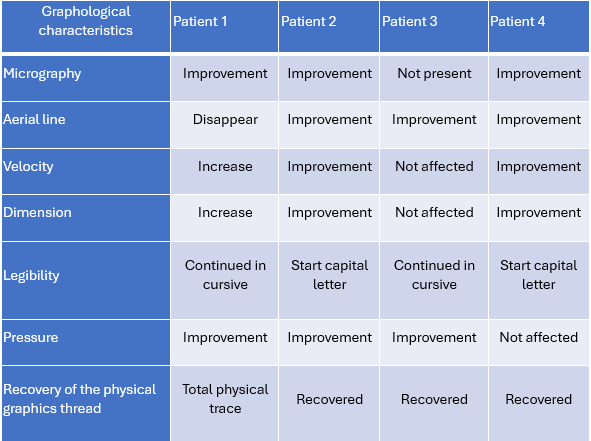Objective: Evaluate the effect of intensive writing training through a virtual workshop once a week and the potential influence in the quality of life in Parkinson Disease Patients.
Background: Written language constitutes a sociocultural development, based on the need of human beings to communicate with each other. The patients with PD “do not respect” (because they cannot) the communication pattern, and that it separates them from “the others.” The writing re-educational task allows the patient returns the feeling of integration.
Method: Graphomotor handwriting training lasted 3 months in the ON levodopa state, with 12 weekly sessions held via Zoom, each lasting 60 minutes. Patients gave informed consent before participation. Training focused on regulating writing force, signature formation, tracing oscillations, and improving non-dominant hand skills, with music tailored to activities. Pre- and post-intervention evaluations included BDI-II and PDQ-39 assessments. Handwriting was assessed in-person, using traditional methods with A4 sheets and pens, and digitally with the Wacom STU 530 tablet, analyzing usual and dominant hand conditions.
Results: Seven patients with PD (ages 59-79),Allwere in Hoehn and Yahr stage II, clinically stable, and demonstrated cognitive function above 24 on MOCA. The final graphological analysis was performed on 4 patients (1 man and 3 women) who completed the 12 sessions proposed for the study. Underwent a graphological analysis after completing 12 sessions. No significant changes were found in BDI-II and PDQ-39 scales. Three patients with micrographia showed improved handwriting speed and size, with two also improving writing pressure and aerial line, enhancing legibility. Two patients resorted to printing for improvement (Table 1). Overall, all patients demonstrated enhanced legibility in their handwriting, although two resorted to printing to achieve this improvement. The workshop occurred during the COVID-19 pandemic, posing challenges in obtaining writing samples.
Conclusion: The improvement in writing was observed in all patients upon completing the workshop, that encourage us to continue the research with the participation of more patients. It would be interesting to evaluate the long-term benefit of the workshop and the possibility of including it within a comprehensive rehabilitation program for patients with PD.
Table 1
References: 1. MS Bryant, EJ Protas. An investigation of two interventions for micrographia in individuals with Parkinson’s disease. Clinical Rehabilitation; 2010; 24: 1021–1026
2. Adriana Ziliotto, PhD, Maria G. Cersosimo, MD, Federico E. Micheli, MD. Handwriting Rehabilitation in Parkinson Disease: A Pilot Study. Ann Rehabil Med 2015;39(4):586-591.
3. Evelien Nackaerts MSc, Elke Heremans PhD, Griet Vervoort MSc, Bouwien C.M. Smits-Engelsman Prof, Stephan P. Swinnen Prof, Wim Vandenberghe Prof, Bruno Bergmans PhD and Alice Nieuwboer Prof. Relearning of Writing Skills in Parkinson’s Disease After Intensive Amplitude Training. Movement Disorders, Vol. 00, No. 00, 2016
4. Johnny Collett, Marloes Franssen, Charlotte Winward, Hooshang Izadi, Andy Meaney, Wala Mahmoud, Marko Bogdanovic, Martin Tims, Derick Wade and Helen Dawes. A long-term self-managed handwriting intervention for people with Parkinson’s disease: results from the control group of a phase II randomized controlled trial. Clinical Rehabilitation 1–10. 2017
5. Nackaerts E, Broeder S, Pereira MP, Swinnen SP, Vandenberghe W, Nieuwboer A, et al. (2017) Handwriting training in Parkinson’s disease: A trade-off between size, speed and fluency. PLoS ONE 12(12): e0190223.
6. Vanbellingen T, Nyffeler T, Nigg J, Janssens J, Hoppe J, Nef T, Müri René, van Wegen E, Kwakkel G, Bohlhalter S. Home based training for dexterity in Parkinson’s disease: A randomized controlled trial, Parkinsonism and Related Disorders (2017)
7. Nisa Vorasoot, Pichet Termsarasab, Kunlawat Thadanipon, Teeratorn Pulkes. Effects of handwriting exercise on functional outcome in Parkinson disease: A randomized controlled trial. Journal of Clinical Neuroscience. 2019
To cite this abstract in AMA style:
F. Echeverria, P. Sanchez Diaz, S. Revellini, G. Costa, G. Ziegler, S. Rodriguez Quiroga, T. Arakaki, N. Garretto. Writing rehabilitation in parkinson’s disease (pd) through a virtual workshop [abstract]. Mov Disord. 2024; 39 (suppl 1). https://www.mdsabstracts.org/abstract/writing-rehabilitation-in-parkinsons-disease-pd-through-a-virtual-workshop/. Accessed January 5, 2026.« Back to 2024 International Congress
MDS Abstracts - https://www.mdsabstracts.org/abstract/writing-rehabilitation-in-parkinsons-disease-pd-through-a-virtual-workshop/

